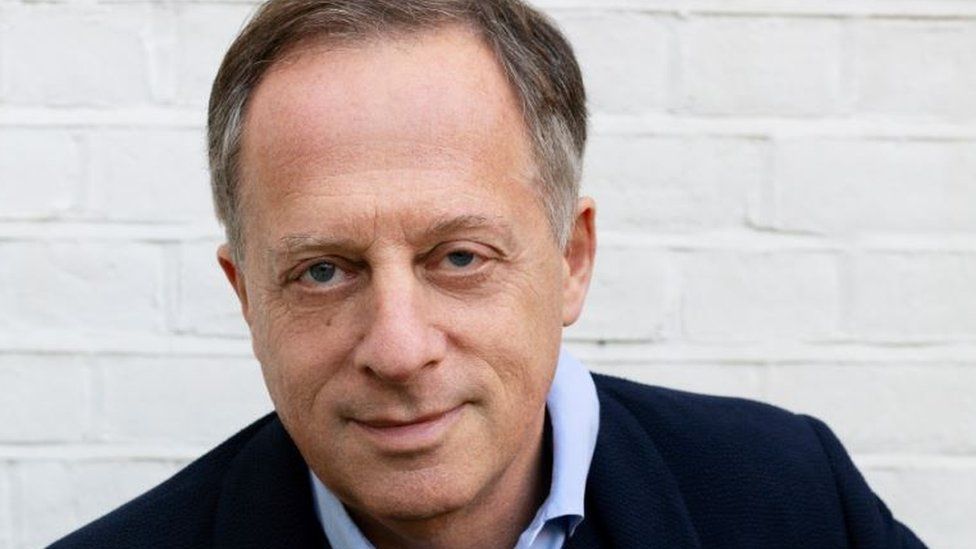Richard Sharp: Who is the former BBC chairman?
- Published

Richard Sharp became chairman of the BBC in February 2021 but has now resigned from that role.
As chairman of the BBC's board, he has been in charge of upholding and protecting the BBC's independence and ensuring the BBC fulfils its mission to inform, educate and entertain.
Mr Sharp quit on 28 April after a report found he breached the rules governing public appointments twice.
He will remain in the post until a successor is appointed in June.
His appointment faced scrutiny after a Sunday Times report claimed that shortly before being given the job, Mr Sharp helped the then-prime minister, Boris Johnson, secure a loan guarantee agreement.
Mr Sharp's position as BBC chair has been the subject of two separate investigations - one which has found that he breached the governance code for public appointments; the other a BBC internal review over any potential conflicts of interest Mr Sharp may have had in his role. That review is ongoing.
Mr Sharp faced renewed calls to quit in March, in a row about the BBC's policy on impartiality that saw the corporation take Match of the Day presenter Gary Lineker off air over a controversial tweet.
A former banker, the 67-year-old earns £160,000 a year in the role, which he previously pledged to give to charity.
As a child, Mr Sharp spent part of his childhood in the US, where his father held senior positions at chemical giant Monsanto and telecoms company Cable & Wireless.
Mr Sharp read PPE at Christ Church, Oxford, where he was a neighbour to the journalist Adam Boulton. His 40-year career in finance began with a job at JP Morgan, and then he had a long and very distinguished career at investment bank Goldman Sachs.
There, he was a senior figure when a young Mark Carney - the future Bank of England governor - also worked for the bank.
This connection had some poignancy when Mr Carney, as governor, warned about the potential economic risks of Brexit. Mr Sharp, who supported Brexit but not prominently, disagreed with some of Mr Carney's assessment, seeing more opportunities outside the European Union.
Mr Sharp ended up as chairman of Goldman's Principal Investment in Europe. That is, guiding partners with their investments, rather than on the trading side.
One of Mr Sharp's closest relationships at Goldman was with a young man called Rishi Sunak.
Mr Sharp - a major Tory party donor who was on the board of the conservative think tank, the Centre for Policy Studies - described Mr Sunak to a friend as the best young financial analyst he had seen.
Mr Sharp worked with Rishi Sunak during his time at Goldman Sachs
Mr Sharp went on to work for his old mentee Mr Sunak when he was chancellor, helping the government with loans to business at the beginning of the pandemic. According to BBC journalist Amol Rajan, Mr Sunak was mildly miffed at losing such a close ally at a crucial time, but was persuaded of the merits of Mr Sharp taking up his new role at the BBC.
Mr Sharp has also known Boris Johnson for almost 20 years, the former prime minister said in a statement issued after the Sunday Times published its story about his loan agreement.
Mr Sharp's heritage is Jewish and he is considered by those who know him broadly pro-Israel. He has a twin sister, Victoria, who is a senior judge. Victoria was also the name of his first wife. Mr Sharp had another sister who died young from cancer. Deeply affected by this, Mr Sharp became a supporter of some of Maurice Saatchi's campaigns to improve cancer research, and care for those enduring cancer.
Mr Sharp has a strong pedigree in the arts, as a former chairman of the Royal Academy, and was for many years a member of the Bank of England's Financial Policy Committee.
He has also served on the boards of public and private companies in the UK, Germany, Denmark and the United States.
Shortly after being appointed, Mr Sharp spoke about the licence fee, saying it was the "least worst" way of funding the BBC. But Mr Sharp told MPs he had an "open mind" about how the corporation should be funded in the future, and it "may be worth reassessing" the current system.
Mr Sharp said he was "considered to be a Brexiteer" and had donated around £400,000 to the Conservative Party over the past 20 years.
And when asked by MPs "what's in it for you?" Mr Sharp said: "We're all a product of our upbringing and I was very fortunate with the parents I have, my great-grandparents came to this country escaping tyranny.
"I think I won the lottery in life to be British and if I can make a contribution, I couldn't be happier to.
"The BBC is part of the fabric of all our national identities, it offers education and enrichment and is also important for our position in the world... It is a massive privilege to be chair of the BBC."
During his tenure at the BBC, he defended the broadcaster on numerous occasions and used his platform to highlight the importance of journalism while lamenting the threat of disinformation.
Related Topics
- Published22 January 2023
- Published6 January 2021